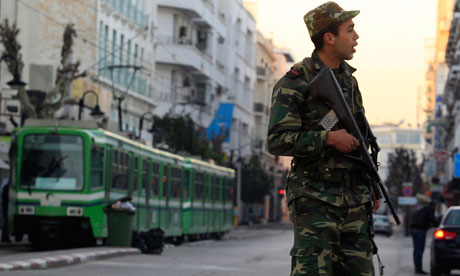Tunisian PM Ghannouchi prepares unity government to halt chaos
![]()
Loyalists of former president Ben Ali exchange fire with special forces as PM promises rapid action to restore order
Mark Tran and agencies

Tunisia’s prime minister plans to announce a government of national unity tomorrow in an attempt to stave off chaos following the implosion of two decades of authoritarian rule under President Zine al-Abidine Ben Ali.
As Tunisia’s politicians scrambled to restore order, special forces exchanged fire with Ben Ali’s former security detail near the presidential palace in Tunis. Tanks were stationed around the capital, and soldiers were guarding public buildings.
Earlier, the relative calm enforced by the army was broken by gunfire near the central bank building and outside an opposition party’s headquarters half a mile away. A helicopter was reported to have killed two gunmen on a roof near the bank.
As the night curfew approached, residents who had been starting to get back to normal life during the day rebuilt makeshift barricades from branches and rubbish bins to protect their property.
Police arrested dozens of people, including the head of security, Ali Seriati and his deputy, who were charged with conspiring against state security, aggressive acts and “provoking disorder, murder and pillaging,” the TAP state news agency reported.
Against the backdrop of sporadic gun battles, the prime minister, Mohamed Ghannouchi, promised rapid action to fill the power vacuum and restore order.”
Tomorrow we will announce the new government, which will open a new page in the history of Tunisia,” he said in a brief statement.
Reuters reported three opposition leaders would take posts in the new coalition, but the current interior and foreign ministers would keep their jobs.
Before Ghannouchi’s announcement, Ahmed Ibrahim, head of the opposition Ettajdid party, said: “The main thing for us right now is to stop all this disorder. We are in agreement on several principles concerning the new government.”
The speaker of parliament, Fouad Mebazaa, was sworn in as interim president, and asked Ghannouchi to form a government of national unity. Constitutional authorities said a presidential election should be held within 60 days.
Opposition parties, however, think such a timetable unrealistic. Two parties have called for presidential elections within six or seven months under international supervision. They want assurances that elections will be free, that they will have time to campaign, that the country would move towards greater democracy, and that the power of the ruling RCD party would be loosened.
Ben Ali fled to Saudi Arabia on Friday after a month of protests over poverty, jobs and repression. Amid fears that the show of people power in Tunisia will be copied elsewhere in the region, Tunisia’s foreign minister, Kamal Merjan, will brief Arab leaders in Egypt on Wednesday.
Tunisians vented their fury at members of Ben Ali’s family. Unconfirmed reports in the Tunisian media said the brother-in-law of the president, Imed Trabelsi, was attacked at Tunis airport and killed. Several hundred people filed through the ransacked villa of the former president’s nephew, Kaif Ben Ali, in the resort of Hammamet. They took photos, picked up souvenirs and stripped out plumbing.
Ghannouchi said the police and the army have arrested many members of armed groups. “The coming days will show who is behind them,” he said on state TV. Weapons and documents had been turned over to judicial authorities. “We won’t be tolerant,” the prime minister said.
The unrest in a country that was supposed to be a model of stability in north Africa cut short holidays for thousands of tourists, who have had to be evacuated.
Last night, returning Britons told of their fear at being caught up in the unrest. “When we went to the airport today it was a bit unnerving,” said Adam Wallace, a 22-year-old security manager from Accrington, Lancashire. “There were police stood on the corners of roads and groups of people hanging about. It did feel a bit intimidating.””There were a few smashed-up buildings, there was a petrol station that had been vandalised and there were people looting, but our resort was quite a way from the trouble.”
Ross Wiseman, from Sunderland, had been less than 36 hours into his holiday.
“Going about the streets before the curfew there were smashed windows, burned-out cars, just one big mess really,” he said. “On the journey to the airport there were armed soldiers on the streets and that was intimidating. You could see the snipers on top of buildings with their guns pointing down on us.”
More than 3,000 holidaymakers and expats have left the country in the last 48 hours on emergency flights. But the Foreign Office said between 1,000 and 1,500 British expats and independent travellers remained.
Related Articles
Tens of thousands march in protest of Hrant Dink verdict
![]()
Tens of thousands of demonstrators march from ?stanbul’s Taksim Square to the site of Hrant Dink murder five years
Médicos Sin Fronteras y SOS Mediterranée anuncian el reinicio de sus operaciones de rescate de emigrantes
![]()
Según datos de la Organización Mundial para las Migraciones, en lo que va de año, han muerto más de 420 personas en el Mediterráneo central
Elecciones fraudulentas: Haiti: la historia interminable
![]()
En estos momentos, se está viviendo lo que podría ser un inicio de golpe de Estado en Haití. Hoy mismo,



